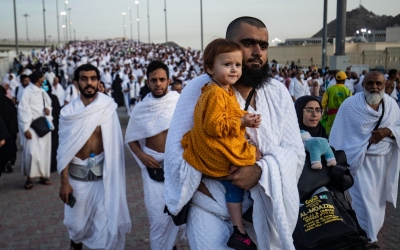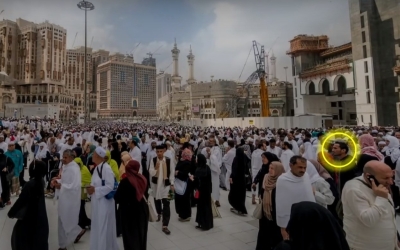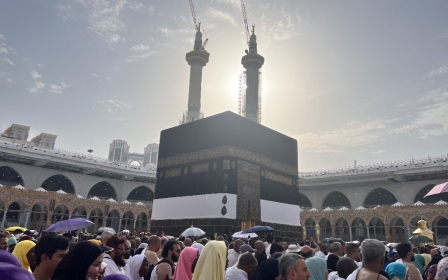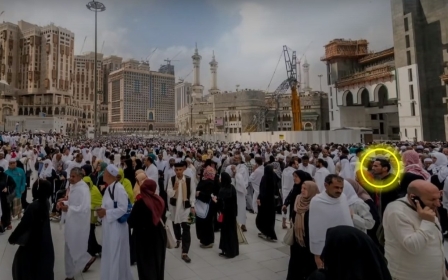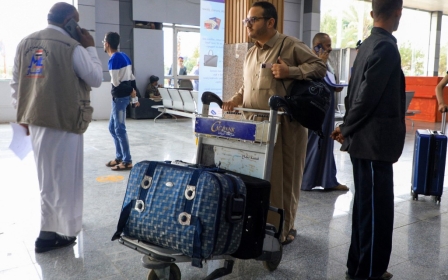Hajj: The pilgrims and travel agents who have been left behind
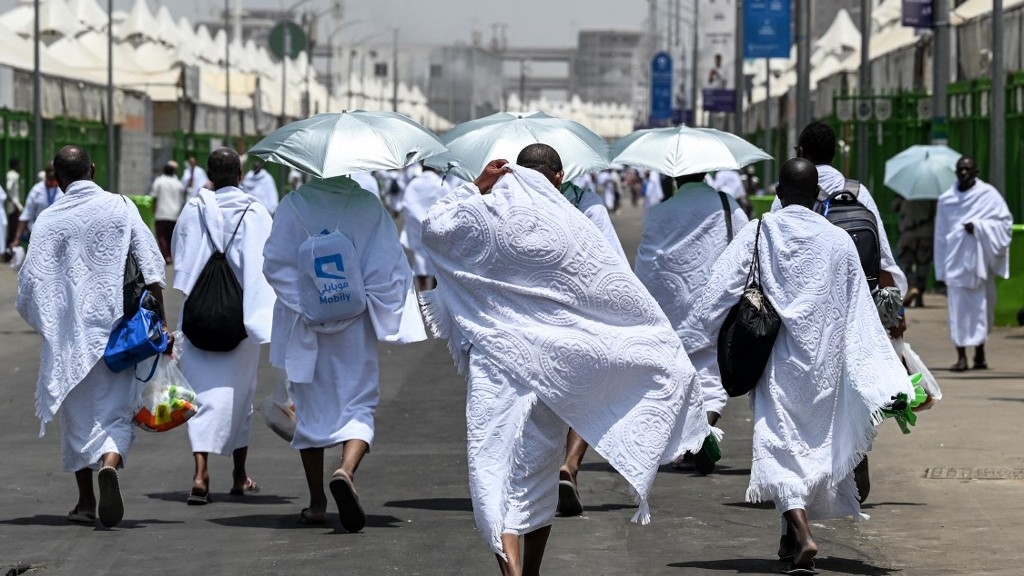
Eleven years ago, Azra Shakeel departed with her husband to Saudi Arabia to do Hajj. For ten days, their four children stayed with her parents in Long Island, New York, while they completed a journey of a lifetime.
In 2012, there was no Hajj lottery system. There was no online application where prospective pilgrims were required to apply. Shakeel had found a travel agency in New York that organised Hajj trips, so she left for Medina (and then Mecca, and then back to Medina) with a group of 20 people.
Hajj, one of the five pillars of Islam, is a pilgrimage required by all Muslims at least once in a lifetime if they have the means to do so. It consists of a series of religious rituals completed over five days in Mecca and its surrounding areas.
The annual pilgrimage of Hajj began in Mecca, Saudi Arabia, on Sunday, with coordinators expecting record-breaking attendance. Organisers say more than 2.5 million people are expected to make the holy Hajj pilgrimage in the heat, now that Covid-19 restrictions have been fully lifted.
In 2022, Shakeel’s brother, Karim Azad, was physically, mentally, and financially ready to make that journey. He reached out to a travel agency and was given bad news.
New MEE newsletter: Jerusalem Dispatch
Sign up to get the latest insights and analysis on Israel-Palestine, alongside Turkey Unpacked and other MEE newsletters
That year, Saudi Arabia introduced new rules, which meant prospective travellers from western countries were required to book their Hajj pilgrimage through a government website, rather than via travel agencies.
Pilgrims from Europe, North America, and Australia had to apply via its Motawif website and would find out if they gained a place via an automated lottery. Azad placed his trust in god and applied.
The website kept crashing, payments wouldn't process, and ultimately, he did not get a spot.
“I am trying to keep faith in Allah and I know my time will come, but it is so hard. It messes with your head and your heart. Is it my fault the website is awful? Is it my fault there is a lottery system?” Azad told Middle East Eye.
This year, western Muslims were introduced to Nusuk, a portal designed by Saudi Arabia's Ministry of Hajj and Umrah, to handle the Hajj packages. Azad, who had been waiting patiently, quickly applied as soon as the application system opened. But the same issues resurfaced.
Like Deja vu, the new website crashed, payments wouldn't go through and Azad missed a place.
“Allah made it easy for me to do Hajj and I am grateful. I know Allah will make it easy for Karim to go, but right now it is difficult,” Shakeel told Middle East Eye.
“[My brother] Karim has the money and he keeps applying. The website keeps crashing. I know that’s a very common issue, but it needs to change. It’s hurting people who desperately want to go," Shakeel said.
While Azad was not able to go this year, Shakeel’s sister-in-law was. The first time she applied, everything went smoothly. She is currently in Mecca preparing for the Day of Arafah, the second day of the Hajj pilgrimage and a day of fasting and prayer that is considered to be one of the holiest days in the Islamic calendar, when Muslim pilgrims gather on Mount Arafah seeking God's mercy.
Azad wishes he was doing the same.
“I’ll apply again next year and the year after that and the year after that. Maybe next year I’ll try going from Pakistan. I hope they bring it back to the old system where we can apply via travel agents,” Azad said.
“But if not, I will keep applying till the day I die. I have the means to go to Hajj. They just need to let me go.”
No longer needed
In previous years, travel agencies were the ones who booked people for Hajj in the United States. Prospective pilgrims would go through a tour operator to plan out their trips.
In 2021, the average Hajj package cost anywhere from $12,000 to $20,000. The cost of the packages was dependent on several factors like accommodation, flights, number of days spent, food, and other services. Booking these packages was big business for travel agencies.
But since the introduction of the online application last year, travel agents have been challenged – some to the point of destruction.
Hasan Yousef had been a Hajj operator for 25 years in the state of New Jersey. Each year, the Hajj season brought a lot of customers. Last year, Yousef’s agency experienced financial hardship. He struggled to keep going. Still, he stuck around and hoped that Saudi Arabia would no longer implement an online Hajj application.
But there is an online application system this year. So Yousef felt he had no choice but to shut down his business. In May, he retired after 25 years.
“I am fortunate that I have sons who support me. But this was something that was a part of me for so long. I loved booking packages for pilgrims and seeing their happy faces,” he said.
“But I am no longer needed.”
Yousef thought that the kingdom would have learned what worked and what didn’t, one year into an online system. But he said it seems as if nothing has changed. He explained that when people booked through travel agents, the process was more intimate.
They were put into groups from their same nationality, so they could converse with each other and eat food they are comfortable with. These things were not taken into consideration last year and are not being taken into account this year. Instead, all pilgrims experience the same broadly-tailored experiences.
“I know so many people who went last year who said that while they were grateful, it was very difficult: old Pakistani couples who needed someone to speak Urdu with them,” he said.
“And I know so many people who could not go this year no matter how hard they tried and how much they sacrificed.”
Though he shut his business down, Yousef still spent the last two months helping people apply on the website without charge. And he said he would continue to do that from now on.
'We are the experts in this. Not the computer. Let us do it again'
- Nouman Ijaz, ex-Hajj operator
“There are so many people who are left behind,” he said.
“I have helped 10 people go to Hajj this year. God willing, I will help more next year.”
But not every story is as positive.
Nouman Ijaz was a Hajj operator in Texas for the last five years, after he immigrated to the US. His business was like bread and butter for his family, which consists of his mother, wife, and two children. Like Yousef, he shut his business down in May.
“It was difficult last year. But I said, ‘Let me wait till next year and see what the situation is’. This year the situation is very bad. There are no customers for Hajj. Everyone goes to the website. I don’t know why Saudi Arabia is doing this,” he said.
By May, it was hard for him to justify paying the rent for his storefront. He prayed it would get better, but it did not. So, he shut down his business. Since May, he’s been trying to figure out what to do next.
“Hajj packages are very hard. You have to organise groups and find guides and hotels. Saudi Arabia thinks one sock fits all. No, it does not. Everyone is different. Everyone has different needs. We are the experts in this. Not the computer. Let us do it again.”
A thousand steps behind
Maria Mohammed has spent the last five years saving up money to make the pilgrimage. She made the intention a week after she converted to Islam in New York. Like thousands of others, she had not anticipated how difficult it was going to be.
Mohammed’s payment did not go through the Nusuk application. She explained that it seemed everything was going fine. When it came time for the payment, there was an error. So she used a different card. Then, it crashed. She said she emailed and called whoever she could. She never received an answer.
'I’ll tie a thousand camels if it means I can go complete this religious requirement'
- Maria Mohammed, prospective pilgrim
“My friend has been sending me photos from Medina and Mecca. I am beyond happy for her. But I am extremely sad for myself,” she said.
“Her life has been changed forever. When you complete Hajj, it’s like you become a new person free from all bad. All my friends are going and I love them, but when is it going to be my turn?”
She said while she understands the concept of placing trust in god, she and a lot of pilgrims feel frustrated and upset.
While it gives them hope when they know people who end up doing Hajj, they feel like they’ve been put back a 'thousand steps'.”
In Islam, there's a saying by the Prophet Muhammad where he says: "Tie your camel first and then put your trust in Allah," meaning, one should do everything in their power first and then trust in god.
“Every time I think I am moving forward, a new complication comes and I am thrown a thousand steps behind. Ultimately, there is good in this and I am sure it is what is supposed to be best for me. But I still have to tie my camel.”
“I’ll tie a thousand camels if it means I can go complete this religious requirement.”
Middle East Eye delivers independent and unrivalled coverage and analysis of the Middle East, North Africa and beyond. To learn more about republishing this content and the associated fees, please fill out this form. More about MEE can be found here.


